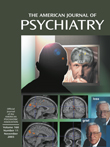A Preliminary Study of Left Frontal Region Error Negativity and Symptom Improvement in Geriatric Depression
Abstract
OBJECTIVE: This study tested the hypothesis that frontal error negative wave amplitude on EEG during Stroop test activation predict change in depressive symptoms in depressed elders. METHOD: Twenty-two older patients with major depression received controlled treatment with citalopram at a target dose of 40 mg/day for 6 weeks. Paramedian error negative waves were recorded during Stroop activation before treatment. RESULTS: Nine subjects who remained symptomatic had larger left frontal error negative waves than the subjects who achieved remission. Left frontal error negative waves were correlated with percent change of depressive symptoms from baseline. Other paramedian error negative waves did not distinguish remitted from unremitted subjects. Left frontal error negative waves were negatively correlated with Mattis Dementia Rating Scale scores for initiation/perseveration; these scores were lower in unremitted than remitted patients. CONCLUSIONS: Increased left frontal error negative waves are associated with limited or slow change in depressive symptoms in elders receiving citalopram.



